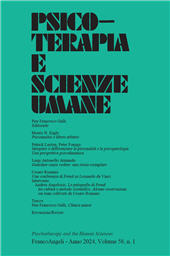Una conferenza di Freud su Leonardo da Vinci
81-96 p.
Si prende in considerazione la conferenza che Freud tenne su Leonardo da Vinci nella seduta del 1° dicembre 1909 della Società Psicoanalitica di Vienna quale anticipazione del saggio Un ricor-do d'infanzia di Leonardo da Vinci (Freud, 1910b). Si cerca di mettere in evidenza la discrepanza tra le ipotesi formulate da Freud e i dati storici allora a sua disposizione. Senza entrare nel merito specifico dell'errore di Freud sul tema dell'avvoltoio, ampiamente presente nella letteratura sul suo scritto, si esprimono perplessità sulle reali conoscenze di Freud nel campo della storia dell'arte e sul metodo da lui adottato nella ricostruzione della personalità di Leonardo, che volutamente trascura dati storici per affidarsi quasi esclusivamente a una psicoanalisi applicata che fa ampio ricorso alla fantasia, tanto che lui stesso definirà lo scritto che seguirà questa conferenza una biografia per metà romanzata.
Un'incongruenza fondamentale di questa relazione, che non sarà emendata neppure nel saggio del 1910, è che Freud definisce "fantasia" ciò che Leonardo indicava chiaramente come un ricordo d'infanzia. [Testo dell'editore].
Freud's lecture given on December 1, 1909, at the Vienna Psychoanalytic Society on Leonardo da Vinci is examined. This lecture is a forerunner of his later article Leonardo da Vinci and a Memory of his Childhood (Freud, 1910b). An attempt is made to emphasize the inconsistency between Freud's hypotheses and the historical data by then at his disposal. Avoiding entering Freud's vulture slip that many scholars have pointed out and Freud never acknowledged, con-cerns are expressed about Freud's required documentation in the field of art history and about the method he employed for the portrayal of Leonardo da Vinci's personality. It seems that Freud willingly avoided historical data choosing almost entirely to rely on applied psychoanalysis wide-ly employing his own phantasies in attempting to overcome the paucity of knowledge on Leonar-do da Vinci's childhood.
Freud himself later acknowledged that his 1910 paper was partly a fic-tional story along the lines of Mereskovskij's 1895 book on Leonardo. A crucial inconsistency of this lecture, that will not be amended in his paper of 1910, relates to the fact that Freud changed into a phantasy what Leonardo had reported as a childhood memory. Many scholars have taken for granted this shift so that they talked about Leonardo's "phantasy" or "dream". [Publisher's text].
Ist Teil von
Psicoterapia e scienze umane : LVIII, 1, 2024-
Artikel aus derselben Ausgabe (einzeln erhältlich)
-
Informationen
ISSN: 1972-5043
KEYWORDS
- Freud, Leonardo da Vinci, Fan-tasia, Psicobiografia, Psicoanalisi applicata
- Freud, Leonardo da Vinci, Phantasy, Psychobiography, Applied psychoanalysis


